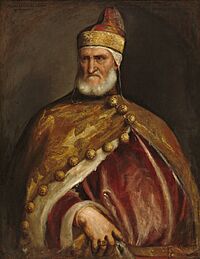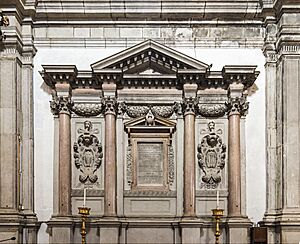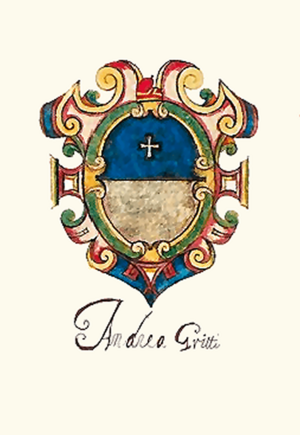Andrea Gritti facts for kids
Quick facts for kids Andrea Gritti |
|
|---|---|

Portrait by Titian (1540s)
|
|
| 77th Doge of Venice | |
| Dogado | 20 May 1523 – 28 December 1538 |
| Predecessor | Antonio Grimani |
| Successor | Pietro Lando |
| Born | 17 April 1455 Bardolino, Republic of Venice |
| Died | 28 December 1538 (aged 83) Venice, Republic of Venice |
| Burial | San Francesco della Vigna, Castello, Venice |
| Spouse | Benedetta Vendramin |
| Children | Francesco, Alvise |
| Dynasty | Gritti family |
| Father | Francesco Gritti |
| Mother | Vienna Zane |
| Occupation | Merchant, military officer, politician |
Andrea Gritti (born April 17, 1455 – died December 28, 1538) was a very important leader in the Republic of Venice. He became the Doge (like a duke or chief magistrate) in 1523 and served until his death in 1538.
Before becoming Doge, Andrea Gritti had a long and exciting career. He started as a successful merchant, trading goods in Constantinople (modern-day Istanbul). He then became a diplomat, representing Venice in the Ottoman Empire. He faced danger when he was arrested for gathering information, but he avoided severe punishment thanks to his good connections.
After returning to Venice, he began a career in politics and the military. Even without much military experience, he became a leader in the Venetian army during the War of the League of Cambrai. He was very good at it! After the war, he was chosen to be the Doge, the highest position in Venice.
Contents
Early Life and Family
Andrea Gritti was born on April 17, 1455, in a town called Bardolino, near Verona. His father, Francesco, passed away soon after Andrea was born. His mother, Vienna, remarried in 1460 and had two more sons, Paolo and Michele, who were Andrea's half-brothers. Andrea was very close to them.
He was raised by his grandfather in Venice, where he received his first education. Later, he studied at the University of Padua. During his youth, he also traveled with his grandfather on diplomatic trips to countries like England, France, and Spain.
Life as a Merchant in Constantinople
In 1476, Andrea Gritti married Benedetta Vendramin, but she sadly died the same year while giving birth to their son, Francesco. After this loss, Gritti moved to Constantinople, the capital of the Ottoman Empire.
There, he became a successful merchant, mainly trading in grains. He often worked with a Genoese merchant named Pantaleo Coresi. His great-uncle, Battista Gritti, helped him learn about important officials and traders in the city. Andrea Gritti lived a good life in Constantinople for nearly 20 years. He lived in the Galata area and had four sons with a woman he lived with: Alvise, Giorgio, Lorenzo, and Pietro.
He became an important person in the Italian community in Galata and had a good relationship with the Ottoman grand vizier (a high-ranking official), Hersekzade Ahmed Pasha. He even gained the respect of Sultan Bayezid II.
Accused of Spying
In 1492, the Venetian diplomat in Constantinople was expelled. Andrea Gritti took on the role of representing Venice, even without an official title. This was a risky position, especially as a war between the Ottomans and Venice was about to start in 1499.
Gritti used his business letters to send secret information to the Venetian Senate about the movements of the Ottoman navy. However, the Turks soon found out. In August 1499, he was arrested and imprisoned in the Yedikule Fortress. He avoided severe punishment only because of his friendship with the grand vizier.
He spent 32 months in the fortress, facing many hardships. He was finally released after a large payment of 2,400 ducats (a type of gold coin) was made. After his release, he returned to Venice. Gritti played a key role in making a peace treaty with the Ottoman Empire in 1502 and 1503. His knowledge of Ottoman customs helped make sure the treaty was clear and fair.
Political and Military Career
His time in prison and the war ended Gritti's career as a merchant. He lost a lot of money. Instead of retiring, he decided to enter politics. He became a member of several important committees in Venice, including the Council of Ten, which dealt with finance and security.
War of the League of Cambrai
In 1508, when Venice's relationship with the Holy Roman Empire worsened, leading to the War of the League of Cambrai, Gritti was given a major military role. This was surprising because he had no military background! However, he was highly respected and could ensure the army had enough money and that the Republic's plans were followed. He inspected fortifications and became a Procurator of Saint Mark's, a very important position.
Gritti showed great energy and toughness as a military leader. He helped reinforce Venetian forces and participated in the difficult Battle of Agnadello against the French. Even though Venice suffered a big defeat, Gritti managed to escape and save a special flag of Saint Mark.
The battle caused Venice to lose control of much of its land in Italy. But Gritti's brave actions became a symbol of Venice's determination to keep fighting. He was put in charge of the city of Treviso and soon showed Venice's strength by recapturing Padua.
Gritti led his army to take back Padua in July. This was a huge symbolic victory for Venice and helped Gritti's political career, eventually leading him to become Doge. He took strong actions to restore order and loyalty in Padua. He also realized that local farmers and peasants were fighting against the enemy forces, and he encouraged the Venetian government to support them.
In 1510, Gritti took command of Venice's army. He continued to serve as a military leader until the end of the war. In 1512, he helped negotiate a peace deal with Francis I of France, which led to Venice leaving the League and becoming allies with France.
Dogeship
Andrea Gritti was elected Doge in 1523. As Doge, he signed a treaty with Charles V, which ended Venice's involvement in the Italian Wars. He tried to keep Venice neutral in the ongoing conflicts between Charles V and Francis I. He urged them to focus instead on the growing threat from the Ottoman Empire in Hungary.
However, he could not prevent Suleiman I from attacking Corfu in 1537. This attack pulled Venice into a new war with the Ottomans. His wife, Benedetta Vendramin, was his dogaressa (the Doge's wife). Many events during Gritti's time as Doge were recorded in the diaries of Marino Sanuto the Younger.
In 1525, Gritti bought the Palazzo Pisani Gritti to be his private home. Andrea Gritti passed away on December 28, 1538.
Images for kids
See Also
- Alvise Gritti
| Political offices | ||
|---|---|---|
| Preceded by Antonio Grimani |
Doge of Venice 1523–1538 |
Succeeded by Pietro Lando |
 | Kyle Baker |
 | Joseph Yoakum |
 | Laura Wheeler Waring |
 | Henry Ossawa Tanner |






